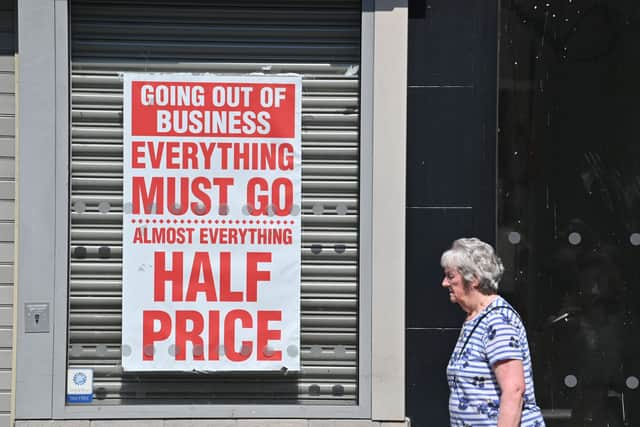When was the last recession? Last time UK was in recession - 2008 and 2020 Covid-19 recession explained
and live on Freeview channel 276
Britain's economy went into a recession in late 2023, after output contracted by more than expected in the final three months, according to official figures.
Official numbers from the Office for National Statistics show that the country's overall economic output, known as gross domestic product (GDP), decreased by 0.3% in the last three months of the year.
This follows a 0.1% drop in the three months before that. Since there were two consecutive quarters of GDP decline, the country is now technically in a recession.
The figures deal a blow to Prime Minister Rishi Sunak, who has promised to grow the economy as one of his five priorities.
But when was the last time the UK was in a recession, and how long did it last? Here is everything you need to know.
When was the last UK recession?
The UK experienced its most recent recession in 2020, triggered by the economic fallout of the Covid-19 pandemic. The country officially entered into a recession in the second quarter of 2020, as it faced the full force of the pandemic.
The rapid spread of the virus forced governments around the world to implement stringent measures to protect public health, inadvertently causing a severe economic contraction.
The gross domestic product (GDP) contracted sharply as lockdown measures, implemented to curb the spread of the virus, led to a sudden halt in economic activities, with businesses closing, travel restrictions in place and consumer spending plummeting.
Key sectors such as hospitality, tourism and retail were particularly hard-hit, experiencing unprecedented declines in revenue. Many businesses faced challenges adapting to the new normal of social distancing and lockdowns, leading to layoffs and furloughs.
The government's furlough scheme, which provided financial support to workers affected by the pandemic, played a crucial role in mitigating the impact on employment and preventing an even deeper economic crisis.
The Bank of England also took unprecedented measures to support the economy during the Covid-19 recession. Interest rates were slashed, and quantitative easing programs were implemented to inject liquidity into the financial system.
These measures were aimed at stabilising financial markets and ensuring that businesses had access to the necessary funds to weather the storm.
As vaccination efforts progressed and restrictions were gradually lifted, the economy began to recover in the latter part of 2020 and into 2021. But the pace of recovery varied across sectors, with some industries experiencing a rapid rebound while others faced more prolonged challenges.


Before 2020, the UK found itself in a recession in 2008, sparked by the Global Financial Crisis (GFC) that stemmed from a collapse in the US housing market and the subsequent failure of major financial institutions.
Since the modern global economy is highly interconnected, financial institutions around the world are linked through various channels, including cross-border investments and international trade.
Financial institutions in the UK, Europe and other parts of the world faced substantial losses due to their investments in complicated financial products and assets related to the US housing market.
The failure of major US financial institutions, such as Lehman Brothers, created a climate of fear and uncertainty in the global financial system. This led to a "credit crunch", as banks became reluctant to lend money to each other and to businesses and consumers.
The reduced availability of credit had a severe impact on economic activity, affecting businesses' ability to invest and individuals' capacity to make purchases, leading to a slowdown in economic growth.
How long did these recessions last?
The duration of recessions can vary, and the official end of a recession is often determined by economic indicators and government agencies.
For the 2008 recession, the downturn lasted for several quarters. It officially began in the second quarter of 2008 and continued until the last quarter of 2009. Therefore, it roughly lasted for about a year and a half.
The 2020 recession, which had a more immediate and severe impact on the economy, officially began in the first quarter of 2020, coinciding with the onset of the pandemic and the implementation of lockdown measures.
However, the UK started showing signs of economic recovery by the fourth quarter of 2020, and the recession lasted for a much shorter duration, with signs of improvement starting to emerge towards the end of the year.
Comment Guidelines
National World encourages reader discussion on our stories. User feedback, insights and back-and-forth exchanges add a rich layer of context to reporting. Please review our Community Guidelines before commenting.
